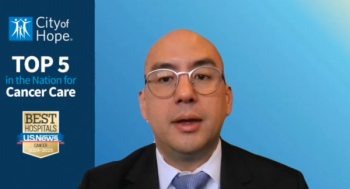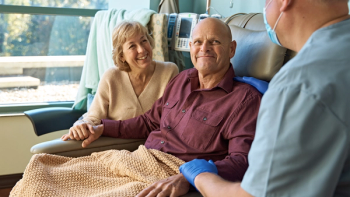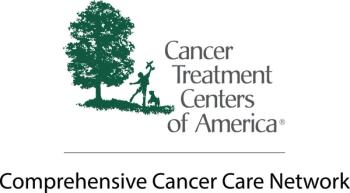
With many patients utilizing medical cannabis, it is important for nurses to be aware of potential drug-drug interactions, an expert said.

With many patients utilizing medical cannabis, it is important for nurses to be aware of potential drug-drug interactions, an expert said.

Panelists discuss how the care team identifies and manages symptoms in chronic graft-versus-host disease patients, particularly those with advanced disease, emphasizing key symptoms to monitor, approaches to symptom identification, and the critical importance of early detection and management for improving patient outcomes.

Panelists discuss how chronic graft-versus-host disease typically progresses in patients requiring third-line treatment and beyond, focusing on severe symptoms, the impact on quality of life, and potential long-term consequences of inadequately managed symptoms.

Panelists discuss how nurse practitioners educate patients about chronic graft-versus-host disease (cGVHD) and its long-term effects, exploring various educational resources and materials such as brochures, apps, websites, and videos that are most effective in supporting patients and their caregivers.

Panelists discuss how chronic graft-versus-host disease (cGVHD) differs from acute GVHD, its main challenges for patients, and its common symptoms and impact on daily life.

An expert explained the importance of having strong communication skills not only for all patients with cancer, but especially for those who received a terminal diagnosis.

Even though wearable technology can track symptoms and physical activity, among other information, in patients with cancer, more research is needed to determine how it all can benefit the management of these patients by oncology nurses.

A new targeted therapy showed promising response rates in pediatric and adult patients with relapsed/refractory KMT2A rearranged acute leukemia.

It is essential to continue to develop and incorporate educational strategies to increase screening for colorectal cancer in our communities.

Jennifer Cargile, MEd, CCC-SLP, shares some examples of how she helped patients continue their daily activities while they experienced symptoms of cancer-related cognitive impairment.

Jennifer Cargile, MEd, CCC-SLP, shares some signs and symptoms of cancer-related cognitive impairment that the oncology nurse should be looking out for.

Leana Cabrera Chien, MSN, RN, GCNS-BC, GNP-BC; and William Dale, MD, PD, discuss the new ASCO geriatric assessment guidelines and what they mean for nurses.

Leana Cabrera Chien, MSN, RN, GCNS-BC, GNP-BC, and William Dale, MD, PhD, discuss why geriatric assessments are important in providing individualized care.

An update to the American Society of Clinical Oncology guidelines state that all patients with cancer who are older than 65 years should receive a geriatric assessment.

A prostate stem cell antigen-directed CAR T-cell therapy agent showed preliminary efficacy in patients with metastatic castration-resistant prostate cancer.

Arletta Jackson, RN, MSN, explains the concept of patient-centric infusion and how it benefits both nurses and patients.

The phase 1/2 TRANSCEND CLL 004 trial met its primary end point by demonstrating that lisocabtagene maraleucel elicited responses in patients with relapsed/refractory chronic lymphocytic leukemia/small lymphocytic lymphoma.

Early coordination with multiple specialty teams can maximize outcomes and improve quality of life for patients with complex metastatic disease.

At the 2023 Tandem Meeting, Jennifer Peterson, MS, RN, OCN, BMTCN, discussed how her institution implemented a successful outpatient CAR T-cell therapy program.

Patients with breast cancer may be at risk for more intense cognitive impairment following treatment with chemotherapy plus endocrine therapy.

Improve care for LGBTQ+ patients with cancer by learning about disparities, focusing on patient-centered treatment, and not making assumptions about patients and their loved ones.

Private Medicare beneficiaries face high access barriers and increased mortality rates following oncologic resection than patients with traditional Medicare plans.

Liz-Hunter Brack, RN, discusses how oncology nurses can play an important role in patient education surrounding genetic testing.

Holistic options like acupuncture and music therapy may benefit those undergoing cancer treatment.

Individuals with AML who underwent a bone marrow transplant are at an increased risk of developing subsequent neoplasms, and other chronic health conditions.

Evolving technology and adaptability allow for a more patient-centric approach to clinical trials; however, there are some limitations.

Two healthcare professionals with Cancer Treatment Centers of America® (CTCA) Phoenix, a comprehensive care and research center recently recognized with Magnet® distinction, discuss the importance of transparency in nursing satisfaction and engagement.

A City of Hope expert underscores the benefit of using antibody-drug conjugates, CDK4/6 inhibitors, PARP inhibitors, and checkpoint blockade in early-stage and metastatic breast cancer.

CTCA Phoenix one of just seven Magnet-recognized hospitals in Arizona

The COVID-19 pandemic has affected oncology practice in many ways. What will safe treating look like moving forward?